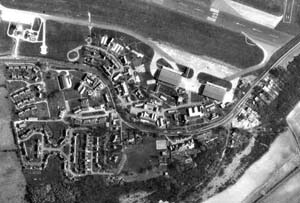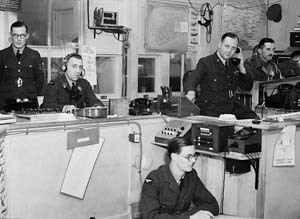The Heroes of Biggin Hill, Yesterday | reviews, news & interviews
The Heroes of Biggin Hill, Yesterday
The Heroes of Biggin Hill, Yesterday
How an entire community was caught up in the Battle of Britain
The Yesterday channel’s ongoing “Spirit of 1940” season has provoked a giant surge in its viewing figures, another reminder of the grip World War Two still exerts on large chunks of the British public. The Battle of Britain in particular has become a self-contained historical moment emblematic of what the British regard, or at least used to regard, as their finest characteristics – patience, courage, stoicism and a dogged refusal to accept bullying European dictatorships. Maybe we haven’t quite let go of that last part. Perhaps the story of our Boys in Blue in the late summer of 1940 gains additional resonance from the way it contrasts so starkly with the meandering aimlessness of Britain’s recent military adventures. It was a battle with a purpose, won by the Brits without any help from the Americans.
 The picture that emerged chimed remarkably closely with the surviving myths about the course of the battle. Local Kentish residents did indeed stand in the roads and fields gazing up at the dogfighting ballet thousands of feet overhead, and one recalled how from the ground machine gun fire sounded “like cloth ripping”. It seems extraordinary that the RAF squadrons were fighting a "nine-to-five" war, taking off to repel the Luftwaffe during the day, then nipping down the pub to hoist a few after darkness fell and the enemy raids ceased, but that’s the way it was.
The picture that emerged chimed remarkably closely with the surviving myths about the course of the battle. Local Kentish residents did indeed stand in the roads and fields gazing up at the dogfighting ballet thousands of feet overhead, and one recalled how from the ground machine gun fire sounded “like cloth ripping”. It seems extraordinary that the RAF squadrons were fighting a "nine-to-five" war, taking off to repel the Luftwaffe during the day, then nipping down the pub to hoist a few after darkness fell and the enemy raids ceased, but that’s the way it was. Although Biggin Hill was smack in the middle of what became known as Hell’s Corner, an area of south-east England under continuous German air attack, there was still a glimmer of sympathy for the enemy. Geoff Greensmith, then aged six, remembered meeting a wounded German pilot who’d landed by parachute in his garden. He produced some photographs of his two childen, and burst into tears. “He was just like us, and like a kid he could cry,” Greensmith concluded.
Although Biggin Hill was smack in the middle of what became known as Hell’s Corner, an area of south-east England under continuous German air attack, there was still a glimmer of sympathy for the enemy. Geoff Greensmith, then aged six, remembered meeting a wounded German pilot who’d landed by parachute in his garden. He produced some photographs of his two childen, and burst into tears. “He was just like us, and like a kid he could cry,” Greensmith concluded.Add comment
more TV
 Blue Lights Series 2, BBC One review - still our best cop show despite a slacker structure
The engaging Belfast cops are less tightly focused this time around
Blue Lights Series 2, BBC One review - still our best cop show despite a slacker structure
The engaging Belfast cops are less tightly focused this time around
 Baby Reindeer, Netflix review - a misery memoir disturbingly presented
Richard Gadd's double traumas are a difficult watch but ultimately inspiring
Baby Reindeer, Netflix review - a misery memoir disturbingly presented
Richard Gadd's double traumas are a difficult watch but ultimately inspiring
 Anthracite, Netflix review - murderous mysteries in the French Alps
Who can unravel the ghastly secrets of the town of Lévionna?
Anthracite, Netflix review - murderous mysteries in the French Alps
Who can unravel the ghastly secrets of the town of Lévionna?
 Ripley, Netflix review - Highsmith's horribly fascinating sociopath adrift in a sea of noir
Its black and white cinematography is striking, but eventually wearying
Ripley, Netflix review - Highsmith's horribly fascinating sociopath adrift in a sea of noir
Its black and white cinematography is striking, but eventually wearying
 Scoop, Netflix review - revisiting a Right Royal nightmare
Gripping dramatisation of Newsnight's fateful Prince Andrew interview
Scoop, Netflix review - revisiting a Right Royal nightmare
Gripping dramatisation of Newsnight's fateful Prince Andrew interview
 RuPaul’s Drag Race UK vs the World Season 2, BBC Three review - fun, friendship and big talents
Worthy and lovable winners (no spoilers) as the best stay the course
RuPaul’s Drag Race UK vs the World Season 2, BBC Three review - fun, friendship and big talents
Worthy and lovable winners (no spoilers) as the best stay the course
 This Town, BBC One review - lurid melodrama in Eighties Brummieland
Steven Knight revisits his Midlands roots, with implausible consequences
This Town, BBC One review - lurid melodrama in Eighties Brummieland
Steven Knight revisits his Midlands roots, with implausible consequences
 Passenger, ITV review - who are they trying to kid?
Andrew Buchan's screenwriting debut leads us nowhere
Passenger, ITV review - who are they trying to kid?
Andrew Buchan's screenwriting debut leads us nowhere
 3 Body Problem, Netflix review - life, the universe and everything (and a bit more)
Mind-blowing adaptation of Liu Cixin's novel from the makers of 'Game of Thrones'
3 Body Problem, Netflix review - life, the universe and everything (and a bit more)
Mind-blowing adaptation of Liu Cixin's novel from the makers of 'Game of Thrones'
 Manhunt, Apple TV+ review - all the President's men
Tobias Menzies and Anthony Boyle go head to head in historical crime drama
Manhunt, Apple TV+ review - all the President's men
Tobias Menzies and Anthony Boyle go head to head in historical crime drama
 The Gentlemen, Netflix review - Guy Ritchie's further adventures in Geezerworld
Riotous assembly of toffs, gangsters, travellers, rogues and misfits
The Gentlemen, Netflix review - Guy Ritchie's further adventures in Geezerworld
Riotous assembly of toffs, gangsters, travellers, rogues and misfits
 Oscars 2024: politics aplenty but few surprises as 'Oppenheimer' dominates
Christopher Nolan biopic wins big in a ceremony defined by a pink-clad Ryan Gosling and Donald Trump seeing red
Oscars 2024: politics aplenty but few surprises as 'Oppenheimer' dominates
Christopher Nolan biopic wins big in a ceremony defined by a pink-clad Ryan Gosling and Donald Trump seeing red

Comments
Why oh why is the voice over